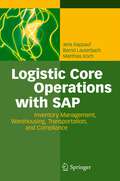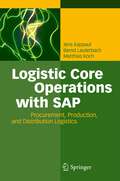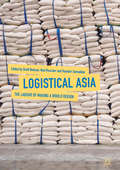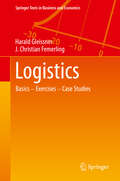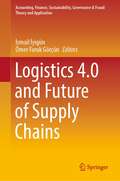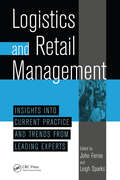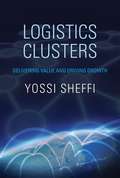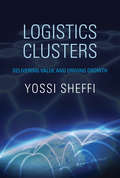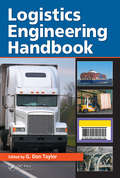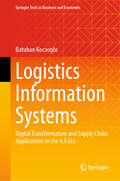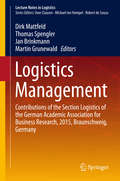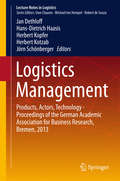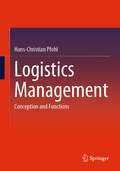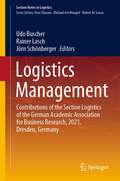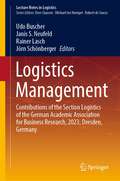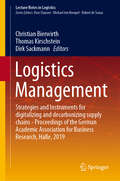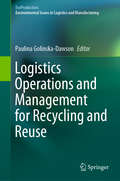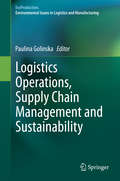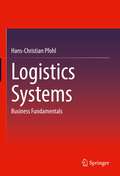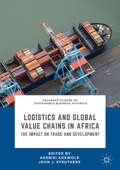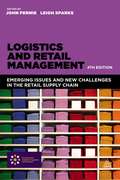- Table View
- List View
Logical Creative Thinking Methods
by Min DingUsing a new, systematic framework, this illuminating book turns ideation into a task anybody with sound logic and a determination to learn can do, and do well, by separating the process from the outcome. In a competitive marketplace, all firms must constantly innovate to create sustained shareholder value. The main roadblock in innovation is ideation: the identification of value-creating ideas, often seen as the work of innately creative people. This first-of-its-kind textbook demonstrates that anyone can ideate through specific logical processes that require no creativity when used, but generate valuable and creative outcomes. To help students master and apply these methods, the book is filled with innovation examples across many sectors that can be explained and recreated using a specific LCT method. The book also includes exercises that enable readers to practice applying each method to solve real life innovation challenges. Upper-level undergraduate and postgraduate students of innovation, creativity, and new product development will appreciate the demystification of ideation into a problem that can be solved by applying a series of rigorous, defined methods that can be followed without ambiguity.
Logics of Resistance: Globalization and Telephone Unionism in Mexico and British Columbia (Transnational Business and Corporate Culture)
by Steve DubbFirst Published in 1999. Routledge is an imprint of Taylor & Francis, an informa company.
Logistic Core Operations with SAP: Inventory Management, Warehousing, Transportation, and Compliance
by Bernd Lauterbach Jens Kappauf Matthias Koch"Logistic Core Operations with SAP" not only provides an overview of core logistics processes and functionality--it also shows how SAP's Business Suite covers logistic core operations, what features are supported, and which systems can be used to implement end-to-end processes in the following logistic core disciplines: Procurement, Distribution, Transportation, Warehouse Logistics and Inventory Management, and Compliance and Reporting. In this context the authors not only explain their integration, the organizational set-up, and master data, but also which solution fits best for a particular business need. This book serves as a solid foundation for understanding SAP software. No matter whether you are a student or a manager involved in an SAP implementation, the authors go far beyond traditional function and feature descriptions, helping you ask the right questions, providing answers, and making recommendations. The book assists you in understanding SAP terminology, concepts and technological components as well as their closed-loop integration. Written in a clear, straight-forward style and using practical examples, it contains valuable tips, illustrative screenshots and flowcharts, as well as best practices--showing how business requirements are mapped into software functionality.
Logistic Core Operations with SAP: Procurement, Production and Distribution Logistics
by Bernd Lauterbach Jens Kappauf Matthias Koch"Logistic Core Operations with SAP" not only provides an overview of core logistics processes and functionality--it also shows how SAP's Business Suite covers logistic core operations, what features are supported, and which systems can be used to implement end-to-end processes in the following logistic core disciplines: Procurement, Distribution, Transportation, Warehouse Logistics and Inventory Management, and Compliance and Reporting. In this context the authors not only explain their integration, the organizational set-up, and master data, but also which solution fits best for a particular business need. This book serves as a solid foundation for understanding SAP software. No matter whether you are a student or a manager involved in an SAP implementation, the authors go far beyond traditional function and feature descriptions, helping you ask the right questions, providing answers, and making recommendations. The book assists you in understanding SAP terminology, concepts and technological components as well as their closed-loop integration. Written in a clear, straight-forward style and using practical examples, it contains valuable tips, illustrative screenshots and flowcharts, as well as best practices--showing how business requirements are mapped into software functionality.
Logistic Real Estate Investment and REITs in Europe
by Gianluca Mattarocci Dilek PekdemirThis book provides a complete analysis of the logistic market, with a special focus on performance and risk characteristics, demand and supply, and diversification strategy. The authors offer cutting-edge research and detailed case studies from countries in Europe, evaluating the market features of the logistic sector and its differences to alternative types of real estate assets. With its comprehensive overview of the logistic market, both academics and practitioners will find this an engaging study, as well as those generally wishing to gain knowledge about investing in this segment of the real estate industry.
Logistical Asia: The Labour Of Making A World Region
by Ranabir Samaddar Brett Neilson Ned RossiterThis book explores how the management science of logistics changes working lives and contributes to the making of world regions. With a focus on the port of Kolkata and changing patterns of Asian regionalism, the volume examines how logistics entwine with political power, historical forces, labour movements, and new technologies. The contributors ask how logistical practices reconfigure both Asia’s relation to the world and its internal logic of transport and communication. Building on critical perspectives that understand logistics as a political technology for producing and organizing space and power, Logistical Asia tracks how digital technologies and material infrastructure combine to remake urban and regional territories and produce new forms of governance and subjectivity.
Logistics
by J. Christian Femerling Harald GleissnerLogistics is the ideal book for Bachelor students of logistics, providing a solid foundation as well as a practical guide. In modular and clear form, it explains key concepts, principles, and practices of logistics. Learning objectives as well as several case studies are integrated into each chapter. It features chapters on Principles of Logistics; Logistics Systems; Transport Systems and Logistics Services; Warehousing, Handling and Picking Systems; Inventory, Stock and Provisioning Management; Logistics Network Planning; IT in Logistics; and Logistics Controlling. In addition, the second fully updated German edition has been extended by the chapters Logistics Infrastructure and Investment and Financing in Logistics. "This book offers, in a very clear and concise manner, access to fundamental management topics of modern logistics. Well-chosen case studies serve to illustrate best practice solutions. " Professor Peter Klaus, member of Logistics Hall of Fame "This new textbook facilitates a comprehensive and easy-to-grasp insight into the complex subject area of logistics. The authors have succeeded in presenting a good mix of theoretical foundation and practical application. Due to its clear structure and extensive range of topics, this book is highly suitable not only for students, but also for practitioners. " Bernhard Simon, Managing Director, DACHSER GmbH & Co. KG
Logistics 4.0 and Future of Supply Chains (Accounting, Finance, Sustainability, Governance & Fraud: Theory and Application)
by İsmail İyigün Ömer Faruk GörçünThis book provides a detailed theoretical background of Logistics 4.0 using real-world examples and case studies and proposes a methodological framework to understand the technological revolutions happening in the present day from the perspective of logistics management. With the fourth industrial revolution, new technologies, such as artificial intelligence, cloud computing, 3D printers and the Internet of Things started to take greater prominence in the world of business. One of the sectors most affected by changes brought on by this Industry 4.0 is logistics, which has given rise to the concept of Logistics 4.0. Covering a wide range of topics on Logistics 4.0, such as warehousing, big data, 3D printing, robotics and cloud computing, this book would be a valuable read for those involved in logistics management, academics and students in the areas of supply chain management, logistics, industry 4, and big data. .
Logistics And Retail Management insights Into Current Practice And Trends From Leading Experts
by Leigh Sparks John FernieThe 1980s witnessed the first step - change in managing the logistics function when stock centralization, contracting out and investment in technologies made a massive impact. The 1990s have experienced further changes that have been mainly concerned with incremental improvements and relationship changes. Academic researchers and industry specialists share their research into retail logistics providing a state-of-the-art report on the key issues. Logistics and Retail Management: Insights into Current Practice and Trends from Leading Experts covers changes in retail distribution and the recent transformation of retail logistics features company profiles of Safeway and Tesco, two of the most respected grocery logistics operations in the UK. It also discusses the internationalization of retailing and its impact on logistics strategy and proves that logistics excellence provides a fundamental competitive advantage.
Logistics Clusters
by Yossi SheffiWhy is Memphis home to hundreds of motor carrier terminals and distribution centers? Why does the tiny island-nation of Singapore handle a fifth of the world's maritime containers and half the world's annual supply of crude oil? Which jobs can replace lost manufacturing jobs in advanced economies? Some of the answers to these questions are rooted in the phenomenon of logistics clusters--geographically concentrated sets of logistics-related business activities. In this book, supply chain management expert Yossi Sheffi explains why Memphis, Singapore, Chicago, Rotterdam, Los Angeles, and scores of other locations have been successful in developing such clusters while others have not. Sheffi outlines the characteristic "positive feedback loop" of logistics clusters development and what differentiates them from other industrial clusters; how logistics clusters "add value" by generating other industrial activities; why firms should locate their distribution and value-added activities in logistics clusters; and the proper role of government support, in the form of investment, regulation, and trade policy. Sheffi also argues for the most important advantage offered by logistics clusters in today's recession-plagued economy: jobs, many of them open to low-skilled workers, that are concentrated locally and not "offshorable. " These logistics clusters offer what is rare in today's economy: authentic success stories. For this reason, numerous regional and central governments as well as scores of real estate developers are investing in the development of such clusters.
Logistics Clusters: Delivering Value and Driving Growth (The\mit Press Ser.)
by Yossi SheffiHow logistics clusters can create jobs while providing companies with competitive advantage.Why is Memphis home to hundreds of motor carrier terminals and distribution centers? Why does the tiny island-nation of Singapore handle a fifth of the world's maritime containers and half the world's annual supply of crude oil? Which jobs can replace lost manufacturing jobs in advanced economies?Some of the answers to these questions are rooted in the phenomenon of logistics clusters—geographically concentrated sets of logistics-related business activities. In this book, supply chain management expert Yossi Sheffi explains why Memphis, Singapore, Chicago, Rotterdam, Los Angeles, and scores of other locations have been successful in developing such clusters while others have not. Sheffi outlines the characteristic “positive feedback loop” of logistics clusters development and what differentiates them from other industrial clusters; how logistics clusters “add value” by generating other industrial activities; why firms should locate their distribution and value-added activities in logistics clusters; and the proper role of government support, in the form of investment, regulation, and trade policy. Sheffi also argues for the most important advantage offered by logistics clusters in today's recession-plagued economy: jobs, many of them open to low-skilled workers, that are concentrated locally and not “offshorable.” These logistics clusters offer what is rare in today's economy: authentic success stories. For this reason, numerous regional and central governments as well as scores of real estate developers are investing in the development of such clusters.View a trailer for the book at: http://techtv.mit.edu/videos/22284-logistics-clusters-yossi-sheffi
Logistics Engineering Handbook
by G. Don TaylorAchieving state-of-the-art excellence and attaining the cost reductions associated with outstanding logistics efforts is an obvious gain in terms of competitive edge and profitability. As logistics tools evolve in comprehensiveness and complexity, and the use of these new tools becomes more pervasive, maintaining a position of leadership in logisti
Logistics Handbook
by James F. RobesonThe Logistics Handbook encompasses all of the latest advances in warehousing and distribution. It provides invaluable "how to" problem-solving tools and techniques for all the ever-increasing logistical problems managers face -- making it the most complete and authoritative handbook to date. Special features include: * The most in-depth coverage of a wide range of topics, including information systems, benchmarking, and environmental issues * Contributions found nowhere else from the leading executives, consultants, and academics in the field, such as C. John Langley, James Heskett, and David Anderson * State of the art graphics * Information-packed appendixes of logistics publications and organizations This all-inclusive reference will enable the next generation of managers to thoroughly integrate their logistics operations at all levels -- strategic, structural, functional, and implementation -- into a comprehensive logistics strategy.
Logistics Information Systems: Digital Transformation and Supply Chain Applications in the 4.0 Era (Springer Texts in Business and Economics)
by Batuhan KocaogluIn today’s era of digital transformation, the logistics sector is one of the most technology-intensive industries. This book provides a comprehensive overview of the IT infrastructure required for company operations, the types of enterprise software used in logistics, and current data collection technologies. It addresses the terminology, information flows, and application contexts of the necessary software, helping readers to see the big picture without being overwhelmed by technical details. It explains principal methodologies for modelling and designing systems and describes the objectives of project management and system analysis, not to mention why they are so essential to developing information systems. It also defines critical terms before turning to sector-specific hardware and software solutions for logistics operations: data collection, data processing, and data analytics solutions. In addition, the book includes sections that introduce readers to programming and the core of the database, piquing their interest and guiding them to a higher level of specialization. Study questions are provided at the end of each chapter to test reader comprehension. This book will be a helpful resource for students in logistics or professionals working in the fields of business administration, foreign trade, industrial engineering, ERP, or MIS who want to advance their knowledge and skills in the logistics industry.
Logistics Management
by Dirk Mattfeld Thomas Spengler Jan Brinkmann Martin GrunewaldThis contributed volume contains the selected and thoroughly reviewed research papers presented at the conference on logistics management LM2015 in Braunschweig, Germany. The conference of the special interest group in logistics of the German Academic Association for Business Research (VHB) was held in conjunction with the special interest group on production of the VHB. Thus, the papers reflect the current state-of-the-art in logistics and supply chain management while focusing especially on aspects of production logistics, i. e. , facility layout, inventory management, line configuration, or flexible production.
Logistics Management
by Herbert Kotzab Jan Dethloff Hans-Dietrich Haasis Herbert Kopfer Jörn SchönbergerThis book gathers papers presented at the Logistik-Management-Konferenz 2013, which was organized by the VHB Wissenschaftliche Kommission Logistik and held in Bremen, Germany. The papers reflect the current state-of-the-art in logistics and supply chain management, focusing on environmental sustainability in logistics and supply chain network dynamics and control. The target audience primarily consists of researchers and practitioners in the field, but the book may also be beneficial for graduate students.
Logistics Management: Conception and Functions
by Hans-Christian PfohlBased on the drivers of the development of logistics, the success factors of logistics management in excellent companies are analyzed. Logistics management in and between companies requires a change in thinking on the operational as well as on the strategic and normative level of action. The functions of logistics management are explained in detail and discussed with regard to their design. The explanations are based on the presentation of the interplay of the normative, strategic and operational levels of action and the contribution of logistics to the achievement of corporate objectives. Essential building blocks for the implementation of the logistics concept are strategic logistics planning and logistics controlling. In addition to the organizational and operational issues, supply chain management is becoming increasingly important for the interorganizational realization of the logistics concept: because it is precisely from cooperation and collaboration that additional potential for sustainable value enhancement of the company through logistics arises. In order to exploit these potentials, it is important to promote suitable employees in a targeted manner. Therefore, the book concludes with a consideration of the special aspects of personnel management in logistics.On the one hand, the book addresses the practitioner who wants to profitably implement the concepts presented here. On the other hand, it is aimed at lecturers at universities, colleges and academies to support their courses. Students who are interested in the management-related issues of logistics will receive valuable information for their studies and future professional activities.
Logistics Management: Contributions of the Section Logistics of the German Academic Association for Business Research, 2021, Dresden, Germany (Lecture Notes in Logistics)
by Udo Buscher Rainer Lasch Jörn SchönbergerThe work contains selected and thoroughly reviewed research papers of the topics Operations Management, Supply Chain Management, Digitalization, Sustainability, Transportation Management, Process Management, Risk Management, Corporate Social Responsibility and Governance. The papers reflect the current state-of-the-art in logistics and supply chain management and new ideas and technical developments are discussed.
Logistics Management: Contributions of the Section Logistics of the German Academic Association for Business Research, 2023, Dresden, Germany (Lecture Notes in Logistics)
by Udo Buscher Rainer Lasch Jörn Schönberger Janis S. NeufeldThis book gathers peer-reviewed research papers based on selected contributions to the 13th Logistics Management Conference (LM 2023), held on 13.-15.09.2023, in Dresden, Germany. They report on cutting-edge methods and strategies for supply chain management, digitalisation, sustainable development, discussing their application in both manufacturing and service industries.
Logistics Management: Strategies and Instruments for digitalizing and decarbonizing supply chains - Proceedings of the German Academic Association for Business Research, Halle, 2019 (Lecture Notes in Logistics)
by Christian Bierwirth Thomas Kirschstein Dirk SackmannThe conference proceedings contains contributions to the Logistics Management conference 2019. The objective of the LM conferences is to discuss new ideas and technical developments related to the management of logistic systems. A special focus is put on digitalization of supply chains and decarbonization in the transport industry.
Logistics Operations and Management for Recycling and Reuse (EcoProduction)
by Paulina Golinska-DawsonThe aim of this book is to present quantitative and qualitative aspects of logistics operations supporting recycling and reuse. In individual chapters, the authors address various issues related to reverse network configuration and the organization of collection, transportation, warehousing and reprocessing activities. Moreover a number of best practice examples from different countries and industries are provided. This book will be a valuable resource for both academics and practitioners who want to deepen their knowledge of logistics operations and management for recycling and reuse.
Logistics Operations, Supply Chain Management and Sustainability
by Paulina GolinskaThe aim of this book is to present qualitative and qualitative aspects of logistics operations and supply chain management which help to implement the sustainable policy principles in the companies and public sector's institutions. Authors in individual chapters address the issues related to reverse network configuration, forward and reverse supply chain integration, CO2 reduction in transportation, improvement of the production operations and management of the recovery activities. Some best practices from different countries and industries are presented. This book will be valuable to both academics and practitioners wishing to deepen their knowledge in the field of logistics operations and management with regard to sustainability issues.
Logistics Systems: Business Fundamentals
by Hans-Christian PfohlDer Autor erläutert logistische Teilsysteme wie Auftragsabwicklung, Lagerhaltung oder Beschaffungs- und Produktionslogistik aus betriebswirtschaftlicher Sicht. Die veränderten Anforderungen an das Dienstleistungsangebot von Logistikunternehmen werden ebenso behandelt wie gesamtwirtschaftliche Rahmenbedingungen und internationale Logistiksysteme. Das Buch wurde für die Neuauflage umfassend bearbeitet und aktualisiert, insbesondere hinsichtlich statistischer Auswertungen und neuer Entwicklungen wie z. B. RFID-Technologie und Intralogistik.
Logistics and Global Value Chains in Africa: The Impact on Trade and Development (Palgrave Studies of Sustainable Business in Africa)
by Adebisi Adewole John J. StruthersFocusing on global value chains and their importance to trade, this edited collection explores the strategic role of logistics and supply chain infrastructure in the development of Africa. Skilled authors present critical analysis of the current state of logistics in Africa, and suggest improvements to policy and practice which address the issue of poor trading relationships. This book will engage entrepreneurs, academics and policy-makers interested in international business, raising awareness of the need for better trade infrastructure in Africa in order to ensure the continent’s economic development.
Logistics and Retail Management
by Leigh Sparks John FernieThe fourth edition of Logistics and Retail Management has been substantially updated to take account of recent developments in retail logistics. Retailers have recognised the need to have more involvement in supply chains and noted that benefits can be achieved in both service levels and cost reduction. Notwithstanding the major strides made, numerous challenges remain, and new issues are constantly emerging. This book brings together well-known academics and practitioners, who share their research, ideas and experience of current thinking on supply chain management in retail. Reflecting the changing needs of the global marketplace and responding to the challenges faced by retailers, this new book features a chapter on International Fashion Supply Chain Management and another on CSR and the textile supply chain.


